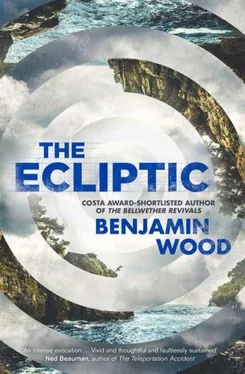He followed me into the kitchen, got the iodine from the cupboard. I sat down at the table. My head was in a daze, and I was shivering again. I could not tell if I was relieved to see him or frightened of him leaving me. Dabbing a cloth into the iodine, he came and pressed it on my wound. ‘It’ll sting,’ he said, but I did not care. ‘Just let me take these flowers in. I’ll only be a moment.’
The through-door from the kitchen was just a wall of beads like you might find at the back of a dreary restaurant. As he pushed through them, they swung and clattered, and I could see into the room beyond. It was a bare shell with no carpet and only a wooden rocking chair for furniture. He had made it into a studio. Two narrow tables were arranged beside an easel with a board set up to paint on.
I trailed after him. He was unscrewing the lid of a tall jar filled with cloudy water. The painting beyond him was only part-finished, but it appeared to show the dying blossoms of a cherry tree scattered over flagstones. He tipped the flowers from his basket into the jar. ‘How’re the fingers?’ he asked, not turning to face me. When the lid was screwed tight, he shook the jar vigorously, side to side.
‘Fine,’ I said. ‘What are you doing?’
‘It’s a process. Helps with the yield.’ And he stopped quaking the jar and put it on the table. He took a metal colander and a bucket from underneath its legs. Removing the lid again, he poured the contents of the jar into the bucket, straining out the sodden flowers. He picked up the colander and began sorting through the petals, selecting only the pinkest, which he placed on a wad of fabric to dry.
I said, ‘Can’t you stop all that for a second and talk to me?’
‘Sorry, it’s really quite time-sensitive. I just need another moment.’ He patted the flowers and folded them into the fabric, as though wrapping a parcel. ‘You might want to close your ears.’ With the base of his fist, he thumped down several times on the parcel, and all of the brushes and tube paints on the table rattled like fine china. Then he scraped the flowers into a mortar and started grinding. He turned to me, working the pestle, and looked over at the clock above the hearth. ‘Twenty minutes until this lot needs to come out,’ he said. ‘That’s all the time I have for talking.’

I sensed that Jim’s account of things had been rehearsed so many times in his head over the years that he had learned how to hesitate at just the right moments in the telling of it; when to stutter and stumble over details, which gaps to skim over and which joins to show. But I was simply glad to hear him speak. Too much time had elapsed without the sound of his voice near me. I did not try to interrupt or scrutinise. I just sat in the rocking chair, watching the motions of his mouth as he formed the words. How much of what he told me was a falsehood I could not tell, but if it hurt me less than the truth, I was willing to bear it.
His story went that he had left London on a pilgrimage. One by one, he had revisited all of the towns where he had been stationed in the war. ‘Looking for what, I don’t quite know,’ he said. ‘I just knew I had to get back there.’ A doctor had put the notion in his mind. He had awoken on the floor of his old studio, feeling raw from three days’ drinking, and could not feel his fingers. There was no sensation in his lower arms at all, he said, but he had managed to get dressed—‘Don’t ask me how’—and taken himself to a doctor’s surgery near Abbey Road. The doctor had knocked his elbows with a reflex hammer and listened to his heart, told him everything was fine. If the feeling did not return by tomorrow, he should come back again, but it was likely just a temporary side-effect of the alcohol — he should really think about cutting back. Jim had told him he would sooner cut back on breathing. Then, on the wall above the doctor’s typewriter, he had noticed a framed print. ‘It was a reproduction of a Stanley Spencer. Horses pulling wounded soldiers into a hospital tent on — what are they called? Travoys. You know, those big long stretchers? Anyway, it’s an incredible painting. One of his best.’ The doctor had said it was there to remind him of his days as a medic in the Great War — not that he would ever forget his experiences, of course, just that the picture inspired him to keep practising through the more difficult moments. On the way home, Jim could not get the image from his mind. It had made him think of his own picture of his friend at the Prince Alfred. ‘And I thought, that’s what my painting has to do to people. That’s what I have to communicate.’ So he had cleared everything from his studio that afternoon, headed to the bank to withdraw his savings, and set off.
The only things he took with him were a clean set of clothes, a blank sketchbook with a few coloured pencils, an old journal from his days with the regiment, and a bottle of Glenlivet, which he poured over the side of the ferry on the way to Calais. ‘I knew I couldn’t go back there drunk. I had to stand up and face it all or the whole trip would be pointless. I felt rough as dogs those first few days, but I got through it.’ He rode a bus down to Arras, where he had first been stationed with his unit: ‘The place had changed a lot, naturally, but the noise of the town was the same as I remembered — there used to be an airstrip there, and planes would come in and go out all the time, but in the quiet spots, you know, there was always an alarming quiet. The way the wind shakes up the fields over there — it’s peculiar. Something I won’t forget in a hurry.’ It was here that he had fired his service weapon in anger for the very first time: ‘Shot an unarmed German there from seven feet away: total panic job, coming round the blindside of him.’ After several months in Arras, he caught a train north to Dunkirk, which he said had changed unnervingly. ‘I was glad I went back. It’s important to see a city how it ought to be, you know, not clothed in all the miseries of war. Not with tanks and sandbags and all that screaming chaos. But seeing it again, so quiet, left me feeling quite disturbed, if that makes sense. There was a part of me that I knew would always be stuck there. I lost a lot of friends on that patch of land.’ Still, he was not satisfied with any of the sketches he made on his return to these places — the work did not resound as brightly as his memories of them.
One night in Dunkirk, he started drinking again. ‘I thought if I just stuck to the local brew, I’d be able to handle it. Well, I’m not a particularly smart fella when it comes to drink, as you know.’ He got into a brawl with a young French poet who had been reading his work aloud in the bar. ‘I wasn’t in the mood to hear poems. It was that awful, dismal sort of French stuff — just a roll of sounds without any meaning — so I started hassling him about it and he didn’t much like it. I ended up losing a tooth—’ He paused here to show me the gap. ‘—and the lad fractured his thumb. The both of us got thrown into the locker at the police station overnight. Adjoining cells. We didn’t speak to each other for a bit, but then he came over and started apologising — he was in tears. I thought, Hang on, this lad’s got problems. And it turns out he did. His parents had just died, two weeks ago, so he said, and he hadn’t been coping with it very well. That’s what his poems had been about. And he’d been run out of the last town he was in because he’d slapped some poor bloke for goading him, too. That makes him sound like a terrible lad — he wasn’t at all. Just troubled.’ They became friends (this was the only part of Jim’s story I did not need to question, knowing how men like to find compassion for each other after they have traded punches, never before) and the poet invited Jim to stay with him and his sister in his family’s house in Giverny for the summer. ‘I heard “Giverny” and remembered it was where Monet used to have his garden with the lilies — so I thought it couldn’t be that bad. And it wasn’t. It was bliss. His parents had left him this beautiful old house. Wildflowers everywhere, hibiscus and pear trees. Glorious sunshine all summer. I didn’t want to leave.’
Читать дальше













